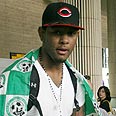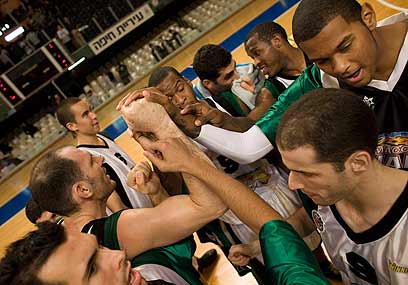
US teen tries to adjust to Israeli pro basketball
A few months ago, Jeremy Tyler was among top prospects in American high school basketball. These days, he spends most of his time languishing on bench after signing one-year, $140,000 deal with Maccabi Haifa
These days, the 18-year-old center spends most of his time languishing on the bench, an inauspicious start to a closely watched basketball experiment.
Tyler, a 6-11 player from San Diego, last summer became the first American to skip his senior year of high school to turn pro. Too young to play in the NBA until 2011, Tyler looked overseas and signed a one-year, $140,000 deal with Maccabi Haifa, an up-and-coming team in Israel’s top division.
Two games into the season, Tyler is very much a work in progress. He’s averaging just more than seven minutes a game and has scored all of one point. He is already is beginning to confront questions about whether he should have stayed in school.
“I only make history if I succeed. I didn’t come here to fail,” Tyler, sounding both frustrated and determined, said after playing a scoreless 4 1/2 minutes in a Haifa victory this week.
Tyler had complained he was bored with high school competition. He now acknowledges a difficult adjustment. No longer the big man on campus, he is just another player on a professional roster, living on his own in a foreign land. There is little socializing with his teammates—grown men, many with families, all trying to carve out professional careers of their own.
Weeks after his arrival, Tyler got a rude introduction to Israeli society when a neighbor complained that he was listening to loud music on Yom Kippur—a major faux pas on the most solemn day of the Jewish calendar. Tyler said he didn’t mean to offend, but his gaffe received heavy coverage on Israeli sports pages.

With fellow team members (Photo: AP)
Since then, he has kept a low profile. Tyler said he stays busy with by putting himself through tough workouts and by studying for his high school equivalence degree. Periodic visits by his girlfriend, parents and agent have helped with the transition. Still, he has no regrets about his decision.
“You got to be a man about the situation, you know. You made a decision, stick with it,” he said. “Sometimes, of course, being in a country that I’ve never been in before, that I’m not familiar with, can be extremely hard.”
As difficult as life can be off the court, Tyler is far more concerned about his performance as a player. In Israel’s pro league, which is full of former US college stars and top European talent, Tyler is playing against tougher competition. Now, the player who averaged nearly 29 points a game last year for his San Diego high school is struggling to get into the game.
“He’s an 18-year-old kid playing in a men’s league. All of the sudden it’s very difficult for him. He’s not the best player on the court for the first time in his life,” said Simi Riger, a longtime Israeli basketball analyst who provides color commentary for the Haifa games.
In the country for only a few months, Tyler is facing expectations few others share. His signing helped drive a 10 percent jump in season ticket sales, and his boyish face adorns team posters plastered in downtown Haifa. When Tyler stood to enter this week’s game, the crowd went wild, the excitement palpable every time he touched the ball.
On the court, Tyler showed glimpses of what has made NBA scouts salivate— explosive speed and the deft footwork of a point guard. But at times, he appeared tentative, waiting for rebounds to come his way or wandering around the perimeter. He picked up an offensive foul 10 seconds after entering and missed his only shot.
“The Jeremy you see today is not the Jeremy that I expect to see at the end of the year,” team owner Jeffrey Rosen said. “My goal with Jeremy is to make him a better player, for him to be a better player and for him to be an impact at the end of the season. And if Jeremy is impactful at the end of the season, I will be very happy.”
Saying all the right things
One of the biggest factors in Tyler’s success could be his relationship with his coach, Avi Ashkenazi. There have been signs the two do not see eye to eye. Ashkenazi said he simply wants to push Tyler hard to help him reach the next level.
“I think in the middle of the season, we will start seeing good things from him,” he said. “But it also depends how tough he will be, if he can manage the situation smart.”
For now, Tyler is saying all the right things: He wants to work as hard as possible to develop the skills and maturity of an NBA player. And he’ll do whatever is needed for Haifa to win, even if that means cheering from the bench.
But he also admitted frustration over his diminished role.
“It’s tough going to practice every day, twice a day, working as hard as you can, and once the game comes, you get no love,” he said.
Aran Smith, president of NBADraft.net, said the basketball world is closely watching Tyler’s development, particularly after a similar move by Brandon Jennings(notes), a high-school standout who skipped college to play in Italy last year. After struggling overseas, Jennings is off to a fast start as a rookie with the Milwaukee Bucks.
Smith said that, barring a meltdown, Tyler should still be a first-round NBA pick in 2011, though his stock could drop from a lottery pick to the lower end of the draft.
“This will be a real test for him,” Smith said in an email. “Will he ‘soldier up’ and rise to the challenge? Or will he run and hide and look for a way out.”










